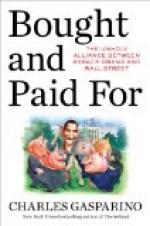Although a girl of high moral principles, she was not innocent. Are there any such? Innocence is, of necessity, the sister of ignorance. The conditions of modern existence render it impossible for any girl, once she has attained the age of fifteen, to continue unacquainted with the main facts of life, and some are initiated at an even tenderer age. How is it possible for any maiden to remain unenlightened in this regard these days when sensational, muck-raking prints throw the searchlight of publicity into every boudoir and spicy details of society’s philandering fill column after column in the breakfast table newspaper? No matter how little curiosity a healthy-minded girl may have, by reason of a natural coldness of temperament, to acquire such knowledge, it becomes, in spite of her, part of her daily surroundings and she cannot escape its contaminating, demoralizing influence.
Virginia was no fool. Now nearly nineteen, she knew everything about life which an intelligent girl should know. What puzzled her most was to determine her own mental attitude towards marriage. Not yet having met a man for whom she could feel any especial regard, the idea of forming with any man as close an association as marriage would mean was repellent to her. The intimate relation the marital tie pre-supposes frightened and appalled her as it has done many times before thousands of passionless, strongly intellectual women who, bringing cold analysis to bear on the sexual instinct, rebel at the subordinate, humiliating role which the weaker sex is called upon to play in Nature’s vast and wonderfully complex scheme.
Not that she was passionless or lacking in temperament. The girl in “whose veins ran lightning” could hardly be accused of indifference to the opposite sex. She liked several young men, but there was not one of them whom she could bring herself to think of in the light of a husband. Girls often married for other than sentimental reasons. Of that she was well aware. Self-interest was at the bottom of most marriages. Cupid, guileless as he seems, is often a shrewd, calculating little gnome in disguise. If a girl has no means, no friends, no way of earning a living, what is going to become of her unless she seeks refuge in marriage? Her first instinct is to find a husband, a man sufficiently well off to support both. There was, of course, only one word with which to brand that sort of thing. It was a legalized form of prostitution, an approved system of cohabitation which must be horrible and detestable to any girl of decent instincts, no matter which way she looked at it, and yet it was a state of white slavery which society fully condoned and ever approved. Hundreds of virtuous girls thus sold themselves—to the highest bidder. The slums had no monopoly of the white slave traffic; it flourished equally well on fashionable Fifth Avenue, where its countless victims, for the honor of the system, managed to conceal their tears from the world.




